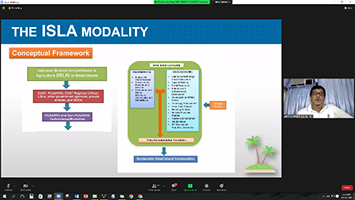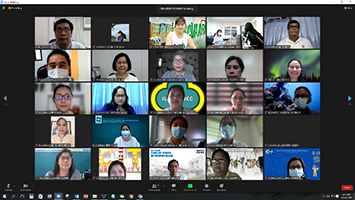 The Philippine Council for Agriculture, Aquatic and Natural Resources Research and Development of the Department of Science and Technology (DOST-PCAARRD) commits to contribute disaster risk reduction (DRR) and management and post-disaster community rehabilitation and reinforcement in the country.
The Philippine Council for Agriculture, Aquatic and Natural Resources Research and Development of the Department of Science and Technology (DOST-PCAARRD) commits to contribute disaster risk reduction (DRR) and management and post-disaster community rehabilitation and reinforcement in the country.
With this commitment, the Council promotes the wider implementation of PCAARRD’s S&T Action Frontline for Emergencies and Hazards (SAFE) Program as well as the Inclusive Science for Livelihood in Agriculture, Aquatic, and Natural Resources (ISLA) in Small Islands Program to its regional Consortia.
Recently, a virtual meeting was held with officials and researchers from partner Regional Consortia and its Member Institutions with the goal of providing them with a common understanding on the SAFE Program and to clearly distinguish it from projects under the GALING-PCAARRD Kontra CoViD-19 Program and other technology transfer and extension modalities like S&T Community-Based Farm (STBCF), Science for the Convergence of Agriculture and Tourism (SciCAT), among others.
Dr. Engelbert R. Lalican, Program Manager of SAFE and ISLA programs, presented the salient features of the modalities.
 SAFE Program is one of the priority components of DOST-PCAARRD’s S&T Plan for Climate Change, which aims to achieve resilient and adaptive communities and ecosystems.
SAFE Program is one of the priority components of DOST-PCAARRD’s S&T Plan for Climate Change, which aims to achieve resilient and adaptive communities and ecosystems.
SAFE Program’s main objective is to provide S&T–based assistance to selected communities as a quick response to existing emergencies and/or hazards within the agriculture, aquatic, and natural resources (AANR) sectors. S&T-based technologies and a combination of both S&T-based and indigenous technologies are introduced to mitigate the impacts of climate change to the environment. The program entails a ridge to reef approach in the AANR sector.
Another initiative of SAFE modality is the ISLA Program, which aims to capacitate the small island communities for disaster risk reduction and enhance their climate change adaptation. Generally, it intends to provide solutions to the challenges in the small island through the convergence of technologies while maintaining a balance between the human and natural environment for sustainable development.
After the virtual meeting, DOST-PCAARRD hopes to receive from the participating regions more research proposals aligned with its priorities as well as with the goals of the aforementioned modalities.
